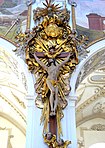Anton Sturm
This article needs additional citations for verification. (July 2014) |

Anton Sturm (30 May 1690, Faggen - 25 October 1757, Füssen) was a Tyrolean sculptor who worked in the Baroque and Rococo styles. His works are primarily located in the Allgäu region and the adjacent parts of Upper Bavaria.
Life[]
According to local records, from 1705 to 1709 he was apprenticed to a peasant sculptor named Johann Paul Tschiderer in Donauwörth. There is no record of his journeyman years, although it appears certain that he did some work at St. Mang's Abbey. In 1721, he married Maria Fellner from Boos, bought a house and set up a workshop just nine days later. He frequently took apprentices (including his own son, Franz Joseph) and employed journeymen, most of whose names have not been recorded. He was held in high esteem and served in several honorary civic positions.
He died at the age of 67. His wife died one year later and his workshop was closed shortly thereafter. In 1994, the local school was named the Anton-Sturm-Volksschule in his honor. It became a Mittelschule in 2010.[1]
His figures may often be distinguished by a distinctive bend in the hip, or beards that are styled in "rolls". Most of his works are done in wood, but look as if they were made of marble. He was equally at home in popular and formal presentations. Apparently, there were times when he had trouble obtaining (or keeping) commissions because he was considered to be too expensive.
Selected works[]
Many works have been attributed to Sturm on the basis of style and location. The following are known to be his. A longer list that includes the attributed works may be found in the corresponding article on German Wikipedia.
- 1720/1721: Schwangau, Parish church of St. Maria und Florian; Altar and pulpit figures.
- 1724/1727: Ottobeuren, Ottobeuren Abbey, Kaisersaal , 16 statues of German Emperors.
- 1731/1733: Bernbeuren, Parish church of St. Nikolaus, Altar figures.
- 1734/1735: Burggen, Pilgrimage church of St. Anna; Altar figures.
- 1738: Ehingen, Parish church of St. Peter and Paul; Kerkerchristus (Christ in the Dungeon).
- 1738/1739: Buxheim, former Carthusian monastery. Liebfrauenkapelle (Our Lady Chapel) and Annakapelle; Altar figures.
- 1739/1741: Oberstdorf, Santa Maria di Loreto Chapel, Altar.
- 1743/1748: Rottenbuch, former Augustinian Monastery; Grave monument for the Provost Patritius Oswald (in marble).
- 1745/1748: Sonthofen, Parish church of St. Peter und Paul; Pulpit and side altar figures.
- 1752: Bad Waldsee, the Count of Waldburg-Wolfegg-Waldsee’s castle; Monumental figure of Maria Immaculata (in marble)
St. Sebastian in the parish church at Wolfegg

St. Magnus in Saint Mang's Abbey
Mercy seat in the parish church at Steingaden

St. Paul in the parish church at Sonthofen
St. Barbara in the parish church at Bernbeuren
References[]
- ^ Anton-Sturm-Schule homepage Archived February 27, 2010, at the Wayback Machine
Further reading[]
- Anton Sturm. 1690-1757. Bildhauer und Bürger in Füssen. Exhibition catalog, Museum der Stadt Füssen, Füssen, 1990.
- Herbert Wittmann: Anthoni Sturmb, Burger Vnd Bildhawer in Fiessen (1690-1757). (sic) with a chronological directory of his works, in: Alt Füssen, Jahrbuch des Historischen Vereins Alt Füssen 2007 (Yearbook of the Historical Society), Kempten 2008, ISSN 0939-2467, pgs.5–106.
- Detlev Schröder: Sturm, Anton, Bildhauer. In: Bosls bayerische Biographie. Pustet, Regensburg 1983, ISBN 3-7917-0792-2, S. 766 (Digitalized by the Universitätsbibliothek Regensburg) [1]
- Anton Sturm (Bildhauer). In: Thieme-Becker: Allgemeines Lexikon der Bildenden Künstler von der Antike bis zur Gegenwart. Vol.32, E. A. Seemann, Leipzig 1938.
External links[]
| Wikimedia Commons has media related to Anton Sturm. |
- 1690 births
- 1757 deaths
- German sculptors
- German male sculptors
- Religious artists




